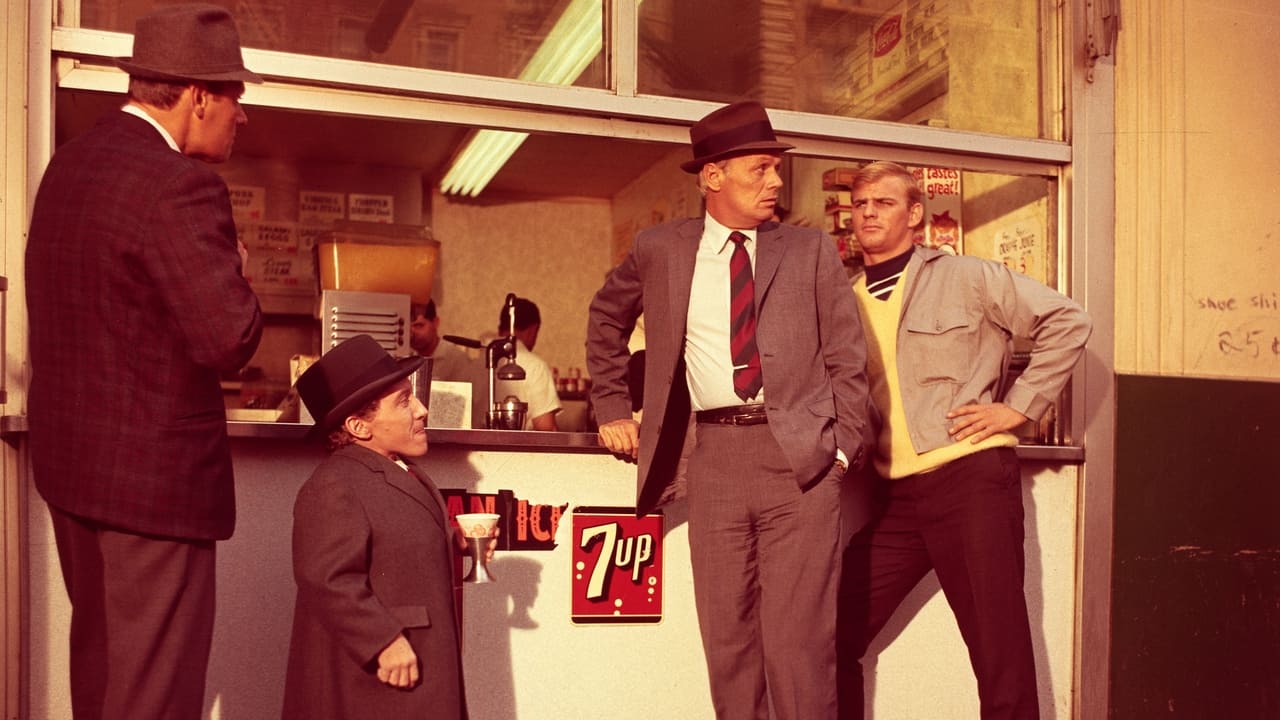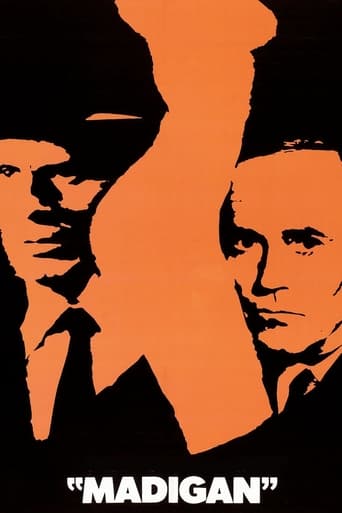



Really Surprised!
It's simply great fun, a winsome film and an occasionally over-the-top luxury fantasy that never flags.
View MoreIt is encouraging that the film ends so strongly.Otherwise, it wouldn't have been a particularly memorable film
View MoreThe movie really just wants to entertain people.
Directed by Don Siegel who had a foot firmly planted in classic Hollywood and who was also a trailblazer in modernizing American action films, "Madigan" serves the perfect bridge between the two. Co-written by Abraham Polonsky, who'd previously been on the Hollywood Blacklist for refusing to testify before the House Un-American Activities Committee, the film follows two different NYPD police officers. One is Madigan, a tough no-nonsense detective played by Richard Widmark trying to catch a killer, and the other is the straight-arrow police commissioner, Henry Fonda, who's balancing justice, politics, and an extra-marital affair. The film was based on a book titled "The Commissioner" and Fonda's character was the original focus of the story, but the producers instead changed the focus to Widmark's Madigan character, so the film unfortunately ends up a an odd combination of two different stories. Both Fonda and Widmark's stories involve them having to balance their work-life and home-life, but neither of those story elements seemed all that interesting. The most interesting part of the story concerned Widmark and his partner, Harry Guardino, on the trail of criminal Steve Ihnat. Watching Widmark and Guardino push the boundaries of acceptable law enforcement in their investigation makes this film an interesting bridge to director Don Siegel's controversial and highly influential vigilante cop film "Dirty Harry" he'd make a few years later. Siegel also makes great use of NYC locations that give ether film added grit and realism, much like we'd later see in William Friedkin's "The French Connection" and Siegel's use of San Francisco in "Dirty Harry." Siegel also skillfully demonstrates his own directional action sequences chops with a memorable showdown in the film's finale, which features with three characters in tight quarters, all with John Woo-style double-fisted pistols in each hand. Overall, "Madigan" features an old style police detective story (with a nice plot nod to Kurosawa's "Stray Dog") that abandons the stylistic German Expressionist roots of American film noir and instead takes the genre into new more realistic and gritty of territory, even if those stronger elements get somewhat undone by dull and unoriginal subplots involving the marital lives of Madigan and the commissioner.
View MoreMadigan is my kind of cop movie, why? Everything about the movie feels so classic. So many classic cop movie tropes are there; the one officer who is determined to play by the book, police corruption, guys in suits who show off their identification, one liners galore and aided by the aura of cool Richard Widmark brings to the screen. Plus is there a more cop name than Madigan? Many of the men in the film wear suits and fedoras with this being the late 60's and the final days in which it was common for working men to do so; although there is a sense of New Hollywood creeping in with the criminals in the movie appearing in that 1970's archetype. Madigan is also one of the best uses of location, never has the grit and grime of the New York streets been captured so vividly.The opening credits are a fantastic montage of New York in the early hours of the morning. This should come as no surprise as director Don Siegel had been a montage creator before becoming a director. I could happily have this movie playing in the background just to listen to the music. The score by Don Costa itself is one of the most underrated film scores I've heard; it's so motivating and makes you want to go and kick some ass. Much of my appreciation of Madigan is due to the film's aesthetics. The film's plots are good if not entirely exception but men are those some fine aesthetics.
View MoreI believe this is a great film, one of Don Siegle's best. Some reviewers did not appreciate the two plots. They thought the Henry Fonda story line was soapy. Actually the contrast between the two plots was the central theme of the movie. The first shot is of the old New York Central train (now Metro North) emerging from the underground to the elevated tracks. It sets the tone. You're still on Park Avenue but you're leaving the wealthy Upper East Side and entering East Harlem which in those days was a tough Italian American neighborhood (my old neighborhood) now known as Spanish Harlem. Fonda, once a street cop is now Police Commissioner his world is among the elites of the City. Widmark and Harry Guardino are two hard nosed detectives who were embarrassed by a psycho who took their guns and then killed another officer. Now they have to track him down. The difference between the two worlds and the different types of decisions that have to be made is what the film is about. The cast is excellent Fonda, scrupulously by the book, Widmark who throws the book away to do what's required of him James Whitmore. the more human Chief of Department, Guardino and the luminous Inger Stevens, the brilliantly filmed final gunfight all make for an unforgettable film.
View MoreMaverick veteran detective Daniel Madigan (a superb and credible performance by Richard Widmark) and his equally seasoned partner Rocco Bonaro (well played by Harry Guardino) have to catch maniacal psycho Barney Benesch (a memorably edgy turn by Steve Ihnat) with 72 hours. Meanwhile, stern by-the-book police commissioner Anthony Russell (Henry Fonda in typically top-drawer form) has personal and professional problems of his own. Director Don Siegel, working from a gripping and thoughtful screenplay by Howard Rodman and Abraham Polonsky, relates the compelling story at a steady pace, makes inspired use of authentically gritty New York City locations, grounds the plot in a thoroughly believable harsh urban reality, maintains a serious no-nonsense tone throughout, and stages the rousing climax with tremendous skill and aplomb. Moreover, this picture acquires additional depth, substance, and even poignancy by showing the troubled private lives of the main characters in a convincing and straightforward manner. The uniformly stellar acting by the first-rate cast qualifies as another major asset, with especially commendable work by Inger Stevens as Madigan's fed-up neglected wife Julia, James Whitmore as the amiable, on the take Chief Inspector Charles Kane, Susan Clark as Russell's classy mistress Tricia Bentley, Michael Dunn as antsy bookie Midget Castoglione, Don Stroud as excitable low-life informant Hughie, and Sheree North as sultry nightclub singer Jonesy. Russell Metty's no-frills cinematography further enhances the overall stark realism. Don Costa's spirited score hits the stirring spot. A worthwhile action thriller.
View More